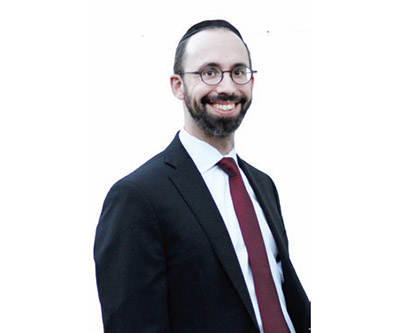
Last week, Rabbi Stechler asked me to bring a few young men from Yeshiva Heichal HaTorah (where I give a morning shiur) to form a minyan for a burial. I came with nine yeshiva boys and asked to be introduced to the relatives. The funeral director responded that this was a direct burial—he was a single man, never married and had no relatives. All they knew was his name, Alfred Piekovsky, Avraham ben Yosef Hakohen.
I couldn’t believe it. I had officiated at many funerals (unfortunately), but I never had the merit of fulfilling a burial of a true mes mitzvah—a Jewish person with no one to bury him. I told the boys we were being given a tremendous opportunity. Hashem chose us on the second day of Chanukah to do the entire burial ourselves, from carrying the coffin to lowering it and filling in the grave. For some of the boys, this was their first burial and they were incredible.
I think of this story as we learn about the burial of Yaakov Avinu. Even Pharaoh recognized the importance and need for proper Jewish burial, granting permission for Yosef, the viceroy, and his brothers to temporarily leave Egypt to bury their noble father, Yaakov!
The loss of Yaakov was the loss of a patriarch, which was overwhelming. We see this in the way the sefer Torah is written, as Parshas Vayechi does not have a space separating it from last week’s Parshas Vayigash, unlike all other parshiyos. This is referred to as parsha stuma—a “closed” parsha. Rashi explains that with the passing of Yaakov, the exile started and everyone’s clarity of vision was dimmed.
The Jewish people suffered a major loss with the recent passing of Hagaon Rav Shteinman. He was a true leader in our generation. Here was a Jew who lived very simply and whose entire life was dedicated to learning Torah and helping out Jews.
My own family also recently suffered a great loss with the passing of my mother-in-law, Rebbetzin Ita Singer. She was born in Romania during World War II and did not have the privilege of a formal Jewish education as a child. The home of her parents was imbued with tremendous faith in Hashem and adherence to mitzvos and the values of Torah. This environment was so powerful that it compensated for her lack of formal Jewish education. Together with my father-in-law Rabbi Singer, she spent 50 years dedicated to raising a beautiful family and helping spread Torah in Passaic/Clifton and beyond. Her selflessness was incredible. Her hobby was her grandchildren and she was the greatest investor in the world, investing all her time and money in her children, grandchildren and in learning and teaching Torah. She is now reaping the rewards.
The loss of a patriarch or matriarch is the loss of their vision and clarity of purpose of life. We are left with a spiritual gap. Nonetheless, our parsha teaches us how to move forward.
Yaakov told Yosef that Yosef’s children, Ephraim and Menashe, will be considered equal to Yosef’s own brothers in clarity and spiritual levels.
Why did Yosef merit this special blessing?
I would suggest that the blessing was merited by Yosef’s great dedication to his father, Yaakov, both as a teenager and then later on, tending to Yaakov’s needs when he was ill and ensuring his father’s proper burial. Devoted care of one’s parents sends a huge message to one’s children and shapes their values for the years to come. Rebbetzin Singer and her sister devoted themselves to the care of their mother for a great many years. My wife and her sisters were witnesses to this devotion and merited to have a close connection and attachment to their grandmother.
“May Hashem cause you to be like Ephraim and Menashe.” Why specifically these two?
Because they were unaffected by the generation gap. There was no interruption in the transmission of vision and clarity of purpose from the prior generation. That is the special blessing we give to our children.
The Sfas Emes goes even deeper. “Vayechi Yaakov”—and Yaakov lived in the land of Egypt. The Chidushei Harim explains, “And Yaakov lived” means much more than just physically lived. It means spiritually lived. Even in the immoral climate of Egypt, Yaakov was able to remain vibrant in his connection to Hashem. This is a lesson for us in exile. Yaakov paved the way. Even in exile, when it’s dark and our vision and mind are limited, we still have an ability to live, grow and connect. As the verse says, “Those who cling to Hashem are alive today.”
May Hashem grant the blessing to all of us that our children be like Ephraim and Menashe.
By Rabbi Baruch Bodenheim
Rabbi Baruch Bodenheim is the associate rosh yeshiva of Passaic Torah Institute (PTI)/Yeshiva Ner Boruch. PTI has attracted people from all over northern New Jersey, including Teaneck, Bergenfield, Paramus, Rockaway and Fair Lawn. He initiated and continues to lead a full multi-level Gemara learning program in the evenings, gives Halacha and hashkafa shiurim on Shabbos and, more recently, has spread out beyond PTI to begin a weekly beis midrash program with in-depth chavrusa learning in both Livingston and Springfield.










